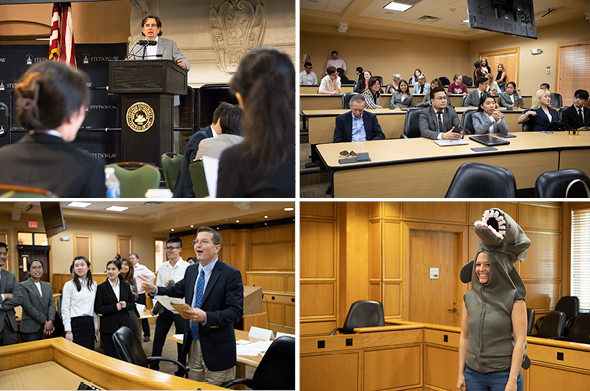IEMCC 2023: Pirates, Deep-Sea Mining & Global Connections

Over three lively days of moot court sessions, 18 teams from 12 countries contended for the top spot at Stetson Law’s International Environmental Moot Court Competition April 13-15.
The final rounds of this international event, now in its 27th year, brought teams of law students to Stetson Law’s Gulfport Campus from Brazil, China, Colombia, India, Ireland, Korea, Nepal, the Philippines, Singapore, Ukraine, United Kingdom, and United States. The two U.S. teams that made it to this round were from the University of Miami School of Law and William and Mary Law School.
The teams argued on either side of a fictional case involving parties from two (also fictional) nations, a state-run deep-sea mining operation for minerals used in electric-vehicle batteries, and a species of shark once believed extinct. A fresh specimen of the shark had been found in a net near the mining site and an environmental group sought to halt mining in the area.
In the end, the team from West Bengal National University of Juridical Sciences in Kolkata, India emerged as this year’s champion. They bested the Law Society of Ireland team in the final round on Saturday, April 15. (See more results below.)
An update from team Ukraine
As the event kicked off, Kateryna Skichko, a coach for the team that traveled from the Educational and Scientific Institute of Law, Taras Shevchenko National University of Kyiv, gave an update on the environmental impacts of the war in Ukraine. It will be a long time before the world will know the extent of it both on Ukraine’s environment and the world in general, she said, given the climate impacts of modern warfare.
“When we speak about armed conflicts, they impact all the world when we speak about climate change,” she said. “The war is ongoing and we cannot assess the level of harm that has already been inflicted, or will be inflicted in years’ time.”
Last year, a Ukraine team was slated to compete in the IEMCC, but that changed when Russia attacked the country on February 24, 2022. In lieu of their presence, they sent a compelling video message to all of the 2022 IEMCC participants.
This year, the team was able to participate in person.
Unsustainable fishing & piracy: a deadly connection
Skichko’s update preceded an insightful conversation with Foreman Biodiversity Lecturer Ed Gardner, a retired Naval Criminal Investigative Service (NCIS) special agent whose work involved extensive enforcement of anti-piracy measures; he is also the brother of Law Professor and Director of Stetson Law’s Institute for Diversity Law and Policy Royal Gardner.
He focused on the connection between unsustainable, habitat-destroying, often illegal fishing practices like high bycatch, bottom-trawling, and blast-fishing and rises in piracy in proximal areas where these practices may be taking place, such as Somalia.
These practices, he said, are in fact a root cause of piracy, a costly problem with a grave economic and human toll as local fishers whose yields are negatively affected by Illegal, Unreported, and Unregulated (IUU) fishing operations turn to extreme measures to feed their families.
“The argument was, you take away their fish, and they’re going to turn to piracy, or they’re going to turn to criminals to protect their fishing, and the criminals themselves become pirates,” Gardner said.
And while fighting piracy across the globe can be a bit like a game of whack-a-mole, Gardner said getting to the root of the problem by fighting IUU could drastically reduce a problem that can cost the economy $16 billion annually in ransoms, property theft, insurance, enforcement, alternative shipping routes, private security, and transportation fees – not to mention the trauma inflicted on piracy victims and their families.
A major source of these overfishing operations are tied to big corporations or national governments, he said.
“The vast majority of illegal fishing is conducted by corporations or state-sponsored fishers,” Gardner said. “That’s going to be the people who have the economic ability to have a refrigerated vessel out at sea, send a trawler out, pack the fish, bring them back to one location, dump them, keep dumping them, and stay out for a year at a time.”
Looking out into a room full of law students from around the globe, he said he is hopeful that they can take this information and help shape policy to fight IUU – and, by extension, piracy – in the future.
“You are in a unique position,” Gardner told his audience. “When you leave and go back and actually become lawyers in your home countries, you’ll have the opportunity to influence legislation, and law, and practice of that law.”
A successful competition
Since 2020, the IEMCC has either been held online or – as was the case in 2022 – affected by COVID-19 travel visa restrictions. This year’s competition was the first in years to see little to no effect from the global pandemic.
The event’s successful run stems from months of planning, namely by Foreman Biodiversity Fellow Katherine Pratt, Law Professor Royal Gardner, Miami Law Professor Erin Okuno and others involved in the Biodiversity Institute.
“It was incredible to see this all come together, and to once again experience Stetson Law’s global connection,” Professor Gardner said. “We expect that the competition’s participants will use what they’ve learned to promote and advocate for policies that help nations ensure sustainability for generations to come.”
More IEMCC 2023 results
- International Finals Champion: West Bengal National University of Juridical Sciences, Kolkata, India
- Runner-up: Law Society of Ireland
- Best Oralist in the Final Round: Sanyam Jha – West Bengal National University of Juridical Sciences, Kolkata, India
- Semifinalists:
- University of San Agustin, Philippines
- University of the Philippines College of Law
- Memorial Awards:
Post date: April 25, 2023
Media contact: Kate Bradshaw
[email protected] | 727-430-1580